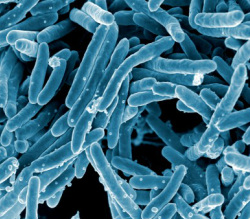
If you do have any of the symptoms mentioned, you can take steps to correct the imbalance in your gut, and build a stronger, healthier immune system.
Here are 4 simple steps to balancing your gut bacteria:
While most people have good intentions when it comes to eating healthy, unfortunately many of us already have unhealthy digestive systems, and the way we eat is akin to throwing gasoline on a fire. Eating the standard American diet is killing the good bacteria in our guts, while actually encouraging bad bacteria to grow - a recipe for disaster.
The first step in turning this around is to avoid toxic and unhealthy foods - these are foods that are either difficult to digest, putting a strain on your already taxed digestive system, or are actually fodder for unhealthy bacteria, allowing them to gain a foothold and start taking over your digestive tract.
These foods include:
- Grains
- Conventional Grain-Fed Dairy
- Sugars
- Unhealthy oils (namely hydrogenated and processed vegetable oils)
You should also take steps to avoid other toxins common in today's modern world, which most people don't pay much attention to. These can be extremely harmful to the balance of bacteria in your gut:
- Non-steroidal anti-inflammatory drugs (NSAIDs) like Advil and Ibuprofen
- Antibiotics
- Pesticides
Step 2. Eat Fermented Foods
Once you have begun reducing your exposure to toxic foods and environmental toxins, it's time to take steps to reestablish and encourage good bacteria to flourish in your digestive tract. One of the absolute best ways to do this is to eat more fermented foods. While humans have consumed naturally fermented foods for thousands of years, unfortunately the modern American diet is almost completely devoid of them now - and we are paying the price, as evidenced by the growing incidence of digestive concerns and diseases.
The good thing is, fermented foods are actually quite easy to make at home, and once you develop a taste for them, you may even start to crave these ancient sources of healthy bacteria!
Great fermented foods include:
- Kimchi
- Sauerkraut
- Lacto-fermented fruits and vegetables
- Non-pasteurized yogurt, cheese, and kefir
Step 3. Take Probiotic Supplements
Fermented foods are something everyone should be eating, and they are the best natural source of good gut bacteria. But sometimes your system needs a boost, and this is where a daily probiotic supplement comes in.
There are a lot of probiotic supplements available in stores these days, but not all probiotics are created equal. In fact, some really don't contain many (or any) live bacteria at all, and are akin to flushing your money down the toilet. Here are a couple of tips for finding good probiotic supplements:
- If it seems like too good of a deal, it probably is - stay away from bargain bin prices - you'll just be wasting your money.
- Look for potency. 8 billion active bacteria per dose is a good start.
- Look for supplements that contain strains of Lactobacillus and Bifidobacterium.
- Jarrow, Klaire Labs, Garden of Life, and BioTrust are good brands.
In today's fast-paced modern world, stress takes a toll on us all - including our digestive systems - and it's not easy to avoid. In fact, it's pretty much going to be a part of your life, no matter what you do. This is why it's so important to learn appropriate stress management techniques to help your body combat the ill effects of stress on your health. Unfortunately, stress management is not something that is taught to most of us, so you've got to find what works for you on your own. Exercise is one of the best ways to relieve stress, and of course it has many other health benefits as well. Yoga, meditation, prayer, and gardening are just a few other methods you can try. Making time for stress relieving activities a priority will go a long way to reducing harmful inflammation and improving your gut health.
You may not think of it quite like that, but another important "stress management technique" is making sure you get enough sleep! Lack of sleep is a common cause of stress - and also makes it more difficult to handle other types of stress, and it can lead to serious health problems over time - including digestive issues and imbalanced gut health. Get at least 7 hours per night for optimal gut (and overall) health.
More science is emerging every day that shows the connection between gut health and other health issues throughout the body. The good news is, good gut health is up to you! By learning what you need to know about keeping your gut bacteria healthy, and then taking steps to correct any imbalances, you can build a strong, healthy digestive and immune system.
By avoiding toxins, eating fermented foods, taking a regular probiotic supplement, and managing your stress properly, you can put yourself and your gut on the right track to good health - possibly reversing health issues that have been a concern to you in the past, as well as preventing new health problems from arising in the future.
To your good (gut) health,
Rose.
P.S. Thanks to Paleo Hacks for the helpful info!



 RSS Feed
RSS Feed